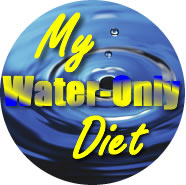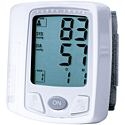Water Only Diet - First Day
 Technically, I started last night. Here was my stats last night:
Technically, I started last night. Here was my stats last night:
Weight: 238
Blood Pressure: 124/85, Pulse 95
I took my blood pressure at Walmart. All I had done was walk from my car to the store and stood near the blood pressure monitors for a few minutes before picking one and then sitting down at the blood pressure machine near the pharmacy. I have no idea why my pulse was kind of high other than general unhealthy.
I ended up buying a very inexpensive monitor from ReliOn. I have to manually inflate it, but it does all the rest. The only one cheaper was one where I’d have to have a stethoscope and listen for my own heartbeat and look at a watch just like a nurse. No thanks. For $28, it is a very nice little device. It uses 4 AAA batteries and can store the last 30 measurements and provide an average. That seems like a nice feature for an older person. All the blood pressure information out there, including the log book that comes with the device, say not to put too much stake into any one reading, but to look at the results of it over the long haul. So, that is what I’ll be doing here.
 You could spend a little more money and find a fairly nice one like this one from Oregon Scientific.
You could spend a little more money and find a fairly nice one like this one from Oregon Scientific.
I have some old data I took last year in January and February of 2005. Over three readings, it shows an average of 121/79 and a pulse rate of 100. Below is the reading from just a few minutes ago.
Blood Pressure: 127/77, Pulse 82
So for the purposes of this experiment, I’m not going to include last year’s data. We’ll just see if by drinking water only if there begins to be a noticeable improvement in my weight and blood pressure. I’m going to post the results in an Excel spreadsheet here.
I had one large glass of water last night - maybe 16 oz. Today was my first day of only water. So far, I’ve had five glasses of water - two with fresh lemons in them. A glass for me is about 12 oz. According to Dr. Batmanghelidj, the average person should work up to drinking half their body weight in ounces of water. So, now that I know I weigh 238, I should be working toward roughly 119 ounces of water - according to this page at OnlineConversion.com, that’s about 9/10’s of a gallon. Dr. Batmanghelidj recommends working up to this, especially for people who have been severly dehydrated. Apparently, my body’s cells may not be used to the fluid and my kidneys may be unable to process the excess fluid effectively at first. If that happened, excess fluid could secrete in places like my lungs causing a few problems. I kind of doubt this would happen as I’m not on diuretics or kidney dialysis or something severe like that. But, still, I don’t want to be rash, so I’m just drinking as I feel comfortable.
The main thing over the next few things will be not drinking other drinks - iced tea, soda, or even orange juice (at first). It is recommended that milk be considered as a food and that if I feel hungry between meals, to drink a glass of water rather than to snack.
So far, I feel the same and right now I’m a little tired, although I don’t think that is necessarily related to this new program. I’m really curious how I will feel this time tomorrow.
I found it interesting that the machine at Walmart labeled anything below 130/90 as “normal”. Most of the things I’ve read indicate the following (which is from the 7th report of the Joint National Committee on Prevention Detection, Evaluation, and Treatment of High Blood Pressure from the National Institutes of Health).
| Systolic (mmHg) | Diastolic (mmHg) | |
| Normal | <120 | <80 |
| PreHypertension | 120-139 | 80-89 |
| Stage 1 Hypertension | 140-159 | 90-99 |
| Stage 2 Hypertension | 160 and up | 100 and up |
Clearly, I’m in the PreHypertension range, although thankfully, hovering near the low end of it. These guidelines are usually accompanied by a warning that says they are only general guidelines because blood pressure depends on our age, morbidity, and treatment strategy by physicians. I couldn’t find any extra information about it on the Journal of the American Medical Association or the NIH websites, both of which are nightmares to navigate and require subscriptions to read most of the stuff on them. But I did find a chart for blood pressure guidelines based on age at http://www.medindia.net/ which let me select my age range. It displayed the following:
| Age | 35-39 Years
|
||
| Min | Avg | Max | |
| Systolic Range (in mmHg) | 111 | 123 | 135 |
| Diastolic Range (in mmHg) | 78 | 82 | 86 |
Of course, I wonder if these numbers are based on a reflection of the population - or are they a guideline - or both? The information isn’t very helpful.
Regardless, I know mine is high because I can feel it. This is what caused me to start looking into blood pressure. A few friends asked if I was okay about a year ago because my face looked rather flushed and I hadn’t been doing any physical labor. They suggested that I might have an issue with blood pressure. I then began thinking about how I felt and I noticed that it did seem like my heart was pumping kind of hard, and I also begin to notice that I felt like lying down more - just to “relax”. I can feel it in my arms and legs if I’ve eaten a big meal or have had a lot of sodium.
Of course, I’ve started trying to get rid of a lot of sodium in my diet anyway, but I doubt I’ve helped much since I drink sodas. I never have put salt on anything when I eat, but this fast food world we live in shoves tons of sodium into a lot of our foods. Especially in canned stews, soups, and chilis. One chili product I bought once for work had 46% of the RDA of sodium in it. It was a little cute can that you heat in a microwave. I was shocked. Just a few of those puppies could have sent me to the hospital.
Pulse rate is even tougher to figure out. According to this page at WebMD, Children age 10 to Adult should have a resting pulse rate of 60-100. That seems like quite a range to me. However, further down it says “well-conditioned athletes” have a resting pulse rate of 40-60, which quickly makes me realize that my pulse rate is clearly way off. I like the 60 number as a long-term target and 70 for more short-term.
It also displays a chart showing the typical “target heart rate” for exercising which is to be between 60 and 80% of my maximum heart rate which is not listed. For a 35 year old, that range is 111 through 148. Obviously, my resting heart rate is not too far from the lower end of my target heart rate for exercising, which indicates that I’m almost excercising just to do a few simple chores around the house. Also, if I do a little backward math and assume 148 to be the 80% of my target heart rate, I can see that 185bpm would be maximum. I assume that maximum means my heart explodes after that? Who knows? The information is not an exact science, but it is enough to see that I’m not going to wait any longer.
Most sites seem to claim that exercise is the one thing that will reduce pulse rate the fastest. Because I’m not exercising initially, it will be interesting to see what effect the water-only diet will have on my pulse rate.
Popularity: 22% [?]
Why not leave a comment below and continue the conversation, or subscribe to my feed and get articles like this delivered automatically to your feed reader. If you don't have a feed reader, I recommend using Google Reader to start. It's free and easy. Otherwise, you can always have these articles delivered to your email inbox every day. Click here to sign up.
 If you like the content of this website and are looking for a way to be notified of new content, look no further. Just click the orange icon to your right and subscribe using your favorite feed reader.
If you like the content of this website and are looking for a way to be notified of new content, look no further. Just click the orange icon to your right and subscribe using your favorite feed reader. Don't have a feed reader? No problem! Just click the email icon to the right and enter your email address. This way, the latest articles from this site will be sent directly to your email inbox. No hassle!
Don't have a feed reader? No problem! Just click the email icon to the right and enter your email address. This way, the latest articles from this site will be sent directly to your email inbox. No hassle!
No comments yet.
Leave a comment
Line and paragraph breaks automatic, e-mail address never displayed, HTML allowed:
<a href="" title=""> <abbr title=""> <acronym title=""> <b> <blockquote cite=""> <code> <em> <i> <strike> <strong>